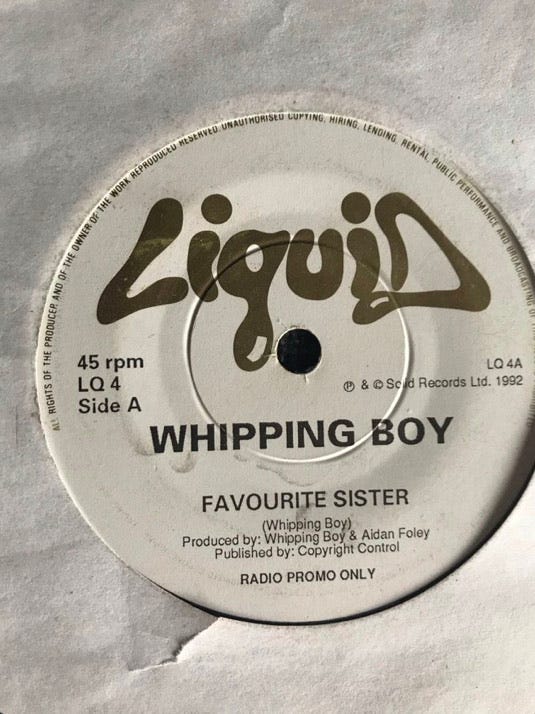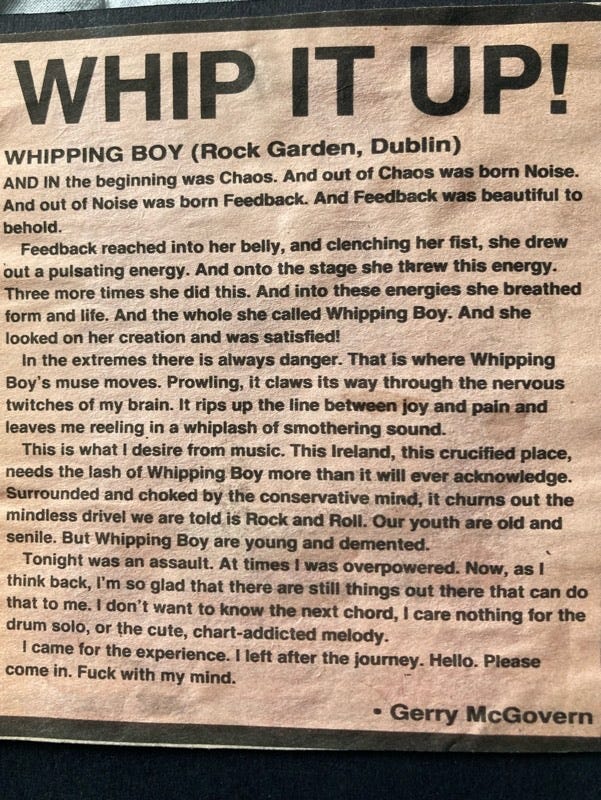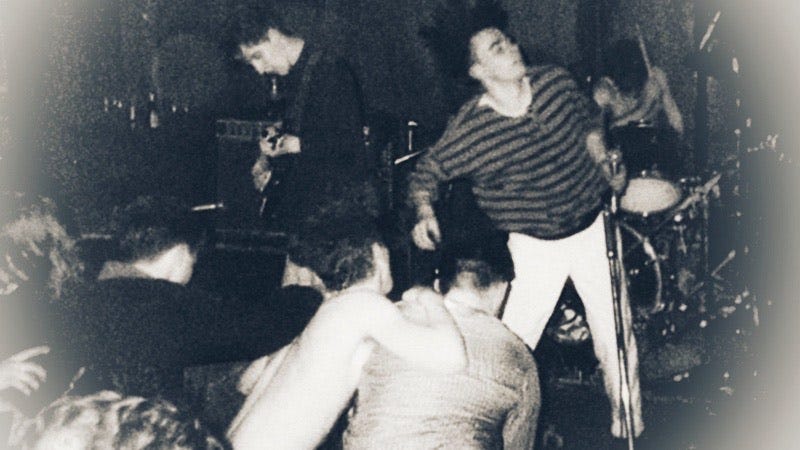Track 14: 'It's the beginning of a new age...'
“For last year's words belong to last year's language, and next year's words await another voice. And to make an end is to make a beginning." TS Eliot
There were nights when we felt untouchable.
When I close my eyes, I can almost feel it, I can return there; the sights, the sounds, the smells.
‘Strangers in the night exchanging glances
Wondering in the night
What were the chances we'd be sharing love
Before the night was through…’
The walk onstage. Shrouded in dry ice. A single strobe light pulsing slowly.
White light, white heat.
In that moment, the audience appeared out of the fog like eager ghosts. Barely visible, but you could sense the anticipation, the breathless excitement.
Entertain me.
Thrill me.
Shock me.
It had to be intense, it had to be searingly loud. It had to make them feel something primal.
And when the fog cleared, to reveal bruised blues and blood smeared reds, it was just us and them.
And that furious, uncontrollable urge to be heard.
On Christmas Eve 1992, the four of us gathered in Doyle’s Pub on College Green.
This would become something of a tradition in the years to come. We would meet up to reflect on the past year, raise a glass, then say our goodbyes before heading our separate ways for Christmas.
1992 had been a good year.
Our first festival appearance at Féile. A mini-Irish tour with Nick Cave and the Bad Seeds. An unfortunate incident at the Galway show where we accidentally ‘re-configured’ the lighting rig almost got us chucked off the Dublin gig, until Nick himself intervened.
The Dublin show at the SFX was special - as we stood side stage waiting to go on, Mylie and I recalled the pledge we made some seven years before after seeing the Bunnymen play there. We had made a promise to each other that one day we would play on that stage. We couldn’t even play an instrument at point. But that was the goal. And now, here we were.
It was a lovely moment, the fulfilment of a modest ambition, but one that meant a lot to the two of us.
In 1992, we had also released our debut album ‘Submarine’. It had been an exciting but frustrating time - there was a prolonged delay before it was released, and when it did come out, Liquid Records seemed unsure how to market it, or who the target audience was.
Adding to the sense of frustration, it had only been released in Ireland, so any momentum we had built up with the Cheree EPs, and the good press we had garnered in the UK was lost. Radio play was virtually non existent, apart from some plays on the Dave Fanning show and on the Dublin-based pirate station Phantom FM.
The silence from the record company following the release of ‘Submarine’ was telling - it became apparent very quickly, that there would not be a follow up release with Liquid Records. They had no plans to do anything further with us. Of course, nobody from the record company communicated that to us, there was just radio silence, which told us everything we needed to know.
So when we met up that Christmas, we did so in the knowledge that we faced an uncertain 1993. We had built up a decent following in Dublin - for the first time, there was a real sense of occasion for the shows we played in the Rock Garden in Dublin. I remember those gigs as some of the best we ever played.
We had pockets of fans in other parts of the country too - Cork, Limerick, Kilkenny, Dundalk and Galway.
But with no record company, it now it felt like we were back to square one. While we were on Liquid Records, they were providing rehearsal space at one of the best rehearsal studios in Dublin, the Factory.
That was swiftly terminated.
So now we were homeless, nomads, with very little money and a real sense that we were going nowhere. The prospect of an endless cycle of sporadic gigs in the usual haunts around the country loomed; it was a rut we wanted to avoid getting stuck in.
In the bleak late winter months of 1993, two things happened that would play a crucial part in shaping our future.
We had a conversation with a friend of the band who challenged how we viewed ourselves at that point in time. Gerry was a friend, a mentor of sorts, who loved the music, and had been a source of encouragement since the very early days.
But he recognised that ‘Submarine’ was a generic guitar album, that signposted its influences a little too obviously. A lot of the bands we liked Gerry would dismiss with a wave of the hand - they were inconsequential, with nothing to say for themselves.
He was drawn to artists like Lou Reed, Patti Smith, Sonic Youth & Public Enemy, musicians and songwriters that wrote about who they were and where they came from. Artists who were not afraid to look inwards, and explore the darker side of themselves and the world around them.
He questioned whether we had the courage to do that.
What had we got to say for ourselves?
We were writing songs with titles like ‘Buffalo’, ‘Beatle’, ‘Safari’. What were those songs even about? Initially, we pushed back, offering a spirited defence, but he had provoked something in us, thrown down a challenge.
Deep down, we knew he was right.
He planted a seed, that would eventually bear fruit with ‘Heartworm’.
Around that time, there was another significant change. Rehearsals had become challenging since the Liquid Records arrangement ended. We flitted from one studio to the next; finding a booking wasn’t always easy, and it was costly.
And then we heard about a room that was available in North Frederick Street in the inner city. Situated down a grubby laneway, the room was tiny, no windows, and it smelled musty; it was a damp unwelcoming space, but it was cheap.
There were no distractions - no pubs or coffee shops we could drift off too to take a ‘break’ from rehearsing.
And crucially, we could leave our gear set up 24/7. The whole charade of setting up and stripping away the equipment after every rehearsal was an absolute pain, and wasted so much time.
The room wasn’t ideal, but the cost of renting for a week was just a little more than one session in other rehearsal studios.
We snapped it up.
The first time we rehearsed there we realised just how small it was once all the equipment was in. We were literally on top of each other.
But here is the thing: in a curious way, the physical dimensions of that room brought us closer together as a band, at a time when almost everyone else had disappeared. There were no friends popping in to see us. There was no time wasting. We got the heads down and worked.
It was just the four of us again.
Like in the early days.
And that bond, that sense of togetherness grew as we started writing in our new home. That room became the breeding ground for some of the best songs we would ever write.
We always wrote best when the four of us were in the room together.
Songs would grow from the germ of an idea; it might a guitar riff, a chord sequence, a bassline. But it was always something spontaneous that created a spark.
One evening, Fearghal arrived in to rehearsal late. We were already set up, just messing about, easing our way into the session. Fearghal stepped up to the mic, his tattered notebook in hand, and just started reading something, cold, dispassionate, detached.
‘In the morning, I am a recluse, lost in memories, ideal situations, I’m never in, and I can’t remember….’
He continued on, this stream of words, unfiltered, raw, with no gaps.
‘I hit you for the first time today, I didn’t mean it, it just happened..’
Fuck.
We struggled to lock into a groove, to find the right tempo, to keep up with him, as the words were delivered with greater urgency, faster, a page of random thoughts, spewed out, spoken, no hint of a melody. No chorus.
He finished, sat down, and there was silence.
“What the fuck is that?” we asked.
“It’s just something I wrote last night”.
We all instantly knew it was something alright.
We ran through it over and over again, paring back the words each time. It hadn’t got a chorus as such yet, but it definitely felt like we were on to something.
We had honed what sounded like the makings of a verse, but we needed that chorus, to break up the dense layers of words. We stitched in a four chord chorus, added heaps of distortion.
It sounded fucking huge, that kick-in.
The contrast between verse and chorus.
At this point, Fearghal was still just reading this stream of consciousness thing over the chorus, but one line just stuck out each time.
‘We don’t need nobody else’.
Double negative, shit grammar, but who cares? It’s rock music not a literary thesis.
So we suggesting taking that line, and singing it repeatedly. It just clicked.
We had our chorus. It sounded like ‘Satellite of Love’.
It seemed apt, the sentiment in that one line, a fuck you to the world. We had each other, we were making music, it was a song of defiance.
It also sounded like nothing we had written before.
And this is the start of the ‘Heartworm’ story. A new chapter.
Gerry had asked that question: ‘what have you got to say for yourselves?’
Here was the answer.








An exciting time for WB, the greatness of Heartworm just appearing around the corner...
Thanks Paul. More great insights into your creative process. Submarine was still something special. I’d a chat with one of the Fontaines about your sound on Submarine and how way ahead it was and agreed the huge influence you had on their band. Well done Whipping Boy 🍀